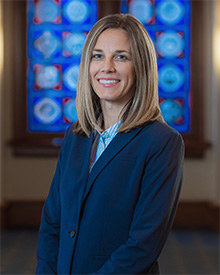Reflection Series: A Mechanical Engineer’s Purpose-Driven Scientific Path Exemplifies the Character of a Preeminent Jesuit Research Institution
More than a decade ago, I met Kira, a bright, energetic sixth grader with blindness who was unequivocally honest about her educational and career prospects. I was in graduate school at Vanderbilt University, doing STEM outreach in local schools.
When Kira found out I was an engineer, she squealed, “An engineer? That’s so cool!” Immediately after expressing her fascination with my career and identity as an engineer and scientist, Kira shared a heartbreaking realization that would forever change the course of my research. “I’ll never be one,” she said.
When I naively asked her why, she noted, “Don’t you know … I’m blind.” Kira went on to describe the specific challenges of learning math as a blind student: She, like many people with blindness or low vision, was challenged with a lack of access: Kira couldn’t see the shapes, graphs, and equations that were being written on the board and discussed in class. With no option but to rely on others for support, Kira had a TVI (teacher of students with visual impairments) who attended class with her and prepared content in accessible formats for her in advance of lessons. If the content changed during class or another example was provided as a topic was explored and discussed, the TVI would quickly try to mock up the content in real time, often using cork boards, rubber bands and push pins to translate concepts into tangible form for Kira.
Kira’s honest communication of these challenges brought my attention to one of the biggest barriers facing learners with disabilities today — lack of access to information that is necessary for exploring and developing passions for math, science and the many disciplines that these underpin.
My research career has since focused on creating technologies that pioneer multimodal, inclusive approaches and interfaces designed with (not for) communities marginalized by an overemphasis on visual media in teaching math and science. That chance encounter in the early stages of my career helped me realize my path of using my engineering training for broad societal impact.
And Saint Louis University has been the perfect place to do this human-centered work. I’ve been supported in cultivating collaborations on and off campus that stretch across multiple stakeholders and disciplines, including computer scientists, STEM education researchers, learning scientists, cognitive psychologists, linguistic anthropologists, digital humanists, industry partners and others.
With this support and connectivity, I have become an engineer who gets to think not just about the complexities of mechanical engineering, math and physics but also about topics like the semiotics of touch-based communication, the performance of medieval manuscripts, and the educational value of embodied, multimodal learning experiences. Most importantly, I get to engage in these diverse intellectual pursuits in intimate collaboration with the communities — like the blind and low-vision community — to drive innovation.
What a powerful testament of what it means to be a part of a preeminent Jesuit research university. I’ve been blessed by colleagues and collaborators who stimulate my curiosity, stretch my knowledge, and challenge my ideas. I’ve been supported by mentors within and beyond my department in aerospace and mechanical engineering, and I’ve been inspired by the ambitious, mission-driven research culture we are building in the School of Science and Engineering and, more broadly, here at SLU. I’ve been supported by outstanding leaders and staff, all of whom make my research possible, in the background. And I’m constantly challenged to remain curious and creative (and to be kept young) with the research scientists, graduate students, and undergraduate students who are the very fabric of my lab.
Emerging from this extensive support network is the opportunity to have a real impact on real people. At SLU, not only do I have the chance to push the boundaries of my field of scientific endeavor, but I simultaneously get to realize a higher purpose for the work I do. I have the privilege to collaborate with [JG3] communities while conducting cutting-edge research and building a more inclusive future for us all.
I have a sign on my office door with the quote, “The best kind of research you can do is talk to people.” About 10 years ago, a brief conversation with Kira about her challenges as a learner with blindness was a critical catalyst to my research. And SLU is a place where this brand of human-driven research is embodied everyday — yes, even in (I’d say especially in!) the sciences and engineering — with a singular purpose of bringing communities of people together to push the boundaries of tomorrow and positively impact the world around us.

Jenna Gorlewicz, Ph.D.
Jenna Gorlewicz, Ph.D., is associate professor of mechanical engineering, director of the People and Technology Horizon (PATH) at SLU, and associate dean of research and innovation in SLU’s School of Science and Engineering (SSE).
Read Other Essays in the Series
Reflection Series: What Does It Mean to Be a Preeminent Jesuit Research University?
Reflection Series: What It Means to Be a Preeminent Catholic Jesuit Research University

















